2023 Readings - Tumblr Posts
Reseña: Boyfriend Material, Alexis Hall

Mi reseña original en Twitter:
I'm back on my bullshit (? Es un libro perfectamente promedio, no destaca por mejor o peor en ningún aspecto A favor, muchos momentos de la nada en la trama son así en la vida real. El desarrollo de personajes me gustó En contra, lo plástico de algunos de ellos, no son genuinos
Comentarios adicionales:
Todas las experiencias y situaciones del libro se me hicieron demasiado "alien" para empatizar o interesarme demasiado, capaz porque es demasiado británico todo o porque mis preocupaciones no pasan tanto por las que tienen Luc O'Donell (hijo de estrellas de rock de los 80s) y Oliver Blackwood (abogado?).
Esto es más una tendencia entre los libros de romanque queer que he estado leyendo este año y el anterior, pero siempre termino sintiendo que las parejas son "unidireccionales": uno simplemente está ahí para ser el Novio Definitivo™, sin mucha razón aparente de porqué le gusta la contraparte, nuestro punto de vista. Así, el Novio Definitivo™ termina siendo un objeto en la trama: Oliver es un abogado con un estricto sentido moral, rígido en sus interacciones sociales, pero que además entrena y "está bueno". The Perfect Good Boy™. Luc es el típico joven adulto con problemas de disciplina y autoestima por traumas del pasado y una infancia difícil emocionalmente. En muy pocas partes demuestra hacer un esfuerzo genuino por Oliver, y siempre son instancias a último momento, llenas de disculpas.
Igual, no sé si es válido criticar un libro por sus personajes, pero si consideramos que es un libro de romance, no está logrando vender el romance y la química entre sus protagonistas, y eso sí es criticable.
En definitiva, un libro muy promedio, muy típico, poco novedoso.
5/10.
Mis otras lecturas del 2023.
Reseña: Cuentos Completos I (Beyond Lies the Wub), Philip K. Dick

Mi reseña original en Twitter:
Lo fui leyendo entre otras lecturas, y planeo leer el resto de los volúmenes. De acá saqué el criterio de buena ciencia ficción y también me dejó un análisis interesante acerca de las diferencias entre relatos cortos/largos y novelas El Hombre Variable y El Factor Letal mis favs
Comentarios adicionales:
Es muy difícil reseñar una antología porque todo lo que reúna varios intentos diferentes de escribir dentro de un género con distintas intenciones claramente va a llevar a contrastes y comparaciones que terminan generando una montaña rusa de altos y bajos dentro de la colección que reúne el libro.
Algunos de sus cuentos nos hablan de civilizaciones del futuro o extraterrestres: Aquí Yace el Wub (!), La Colonia (!), El Cañón, El Factor Letal, El Hombre Variable (!), Estabilidad, La Calavera, El Gran C, Flautistas en el Bosque, La nave de Ganímedes, La Nave Humana, Los Defensores, Los Infinitos, La Cripta de Cristal.
Otros, de un tiempo muy parecido al presente, pero con algunos avances tecnológicos que son el centro de la trama: La Maquina Preservadora, La Niñera, La Paga (!), La Rana Infatigable, La Vida Efímera y Feliz del Zapato Marrón.
Luego, están los que rozan la fantasía más que la ciencia ficción: El Rey de los Elfos, En el Jardín, La Pequeña Rebelión, Sacrificio.
Por último, está Roog, difícil de clasificar, porque es desde la perspectiva de un perro: ¿nuestra tecnología de la vida cotidiana le parece del futuro a los animales? ¿O es más similar a la magia?
Respecto a esto último, la antología incluye una disertación de Philip K. Dick sobre las diferencias entre fantasía y ciencia ficción, y propone que en última instancia es el lector el que decide qué es lo que está dispuesto a aceptar como dentro de lo posible en el universo que el autor le propone, aunque existe cierto consenso acerca de algunos elementos que pertenecen a uno u otro género.
La idea, y valga la redundancia, de que la idea es la pieza central en la ciencia ficción y no los personajes, junto con la forma en que el autor distingue entre los personajes de un cuento o relato corto, a quienes conocemos a través de las cosas que hacen, y los de una novela larga, a quienes conocemos por quienes son y por cómo responden a los eventos de la trama, completan la mirada de Philip K. Dick sobre su propia obra y cómo se plantaba frente a la hoja en blanco a la hora de escribir.
8/10.
Mis otras lecturas del 2023.
Reseña: Husband Material, Alexis Hall
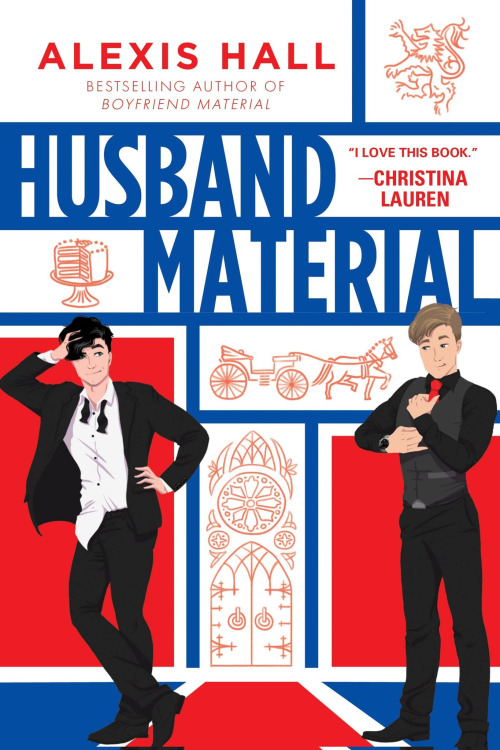
Mi reseña original en Twitter:
Lo leí inmediatamente después del anterior No puedo juzgar muy seriamente el libro porque no es un libro muy serio, pero plantea algunos debates interesantes acerca de la representación e identidad en la comunidad LGBT+ en el personaje de Oliver Odié el final pero es razonable
Comentarios adicionales:
No hay mucha sustancia en este libro, es una serie de bodas de los conocidos y amigos del protagonista y su pareja que funcionan como distintos momentos en que Luc y Oliver van desarrollando sus ideas acerca de su propia boda.
El conflicto se reduce a que los protagonistas son idiotas y el autor nos trata de vender sus discusiones como un profundo comentario acerca de las instituciones, los estereotipos y lo que uno espera habitualmente en una relación. La conclusión a la que llega es que ellos no quieren una boda porque no son como otras personas y ellos se sienten mejor sin esa presión. Mi problema con esto es que el autor no se decide a afirmar una de dos cosas:
las bodas y el estar casados es una institución con reglas, concepciones, deberes y beneficios claros, pero que termina imponiendo un corsé a las relaciones que restringe su florecimiento (y por eso los protagonistas deciden cancelar su boda al último minuto posible, con todos los invitados esperando que entren por el pasillo)
una boda puede significar muchas cosas y la relación matrimonial depende exclusivamente de lo que las partes decidan que significa (como claramente afirmó en la variedad de bodas y relaciones que narra en el otro 90% del libro).
4/10.
Mis otras lecturas del 2023.
Reseña: Arsène Lupin, Caballero Ladrón, Maurice LeBlanc


Mi Reseña en un Tweet:
Abuelo del que ya conocía por Ghibli, Arsène Lupin es un personaje excelente: carismático, inteligente, astuto y rápido. Mucho más agradable e interesante que Holmes, siendo el ladrón "chaotic neutral" Está escrito con elegancia, por momentos con un "unreliable narrator"
Mi Reseña Completa:
De nuevo, Tumblr recibe la primicia de mis lecturas.
Es la primera vez que leo algo de LeBlanc, pero mi segundo acercamiento a un Lupin (tercero si contamos la serie de Netflix que arranqué y nunca terminé). Abuelo de la versión que conocía de las películas de Ghibli, Arsène Lupin es un caballero ladrón, muy inteligente, sagaz, astuto, rápido y ducho en múltiples habilidades que le sirven a lo largo de sus golpes y aventuras.
El libro se presenta de una forma tanto ambigua, a medio camino entre una antología de sus aventuras y una recopilación de algunas de sus memorias hecha a título personal o por un amigo de Lupin, algo que a mi juicio es dejado intencionalmente a interpretación para revestir de mayor misterio al personaje.
En mi opinión, Lupin es un personaje mucho más entretenido que Sherlock y más agradable también, juzgando a ambos en base a un solo libro de sus aventuras (por ahora). Mientras el detective es alguien alineado a "chaotic good" (busca resolver crímenes, ayudar a quienes se acercan a pedirle socorro, pero no duda en recurrir a métodos poco ortodoxos), el ladrón es simplemente "chaotic neutral": roba (duh) con cierto espíritu de Robin Hood por momentos, aunque la mayoría se lo guarda para sí. También es vanidoso en una forma muy encantadora, regodeándose de esquivar siempre a su rival, el detective Ganimard, y escapar de la policía.
Luego de un par de capítulos, el giro principal pierde un poco de impacto, pero nunca deja de causar una sonrisa de cierta camaradería con el personaje y sus hazañas. La prosa está llena de descripciones cuidadas y elegantes, aunque el misterio de cada capítulo suele ser simplemente descrito paso por paso por Lupin al final, una vez realizado el golpe, así que no es tanto un "Whodunnit" porque no da tiempo al lector a tratar de conjeturar posibles respuestas ni le ofrece muchas pistas.
De todas formas, una lectura muy agradable, placentera y llevadera. Reitero mis elogios a esta edición de la colección Salvat, con su tapa dura, forro de tela, filigrana de hilo dorado e ilustraciones originales de M. Toussaint y R. Broders, entre otros.
9/10.
Mis otras lecturas del 2023.
Reseña: Cuentos Completos II, Philip K. Dick

Mi Reseña en un Tweet:
La calidad de los cuentos no supera ni empeora la de los del tomo anterior, pero sí son más coherentes y consistentes en los temas que abordan.
Oscila más del extremo de la Fantasía al de la CF.
La Segunda Variedad, Planeta de Paso y Equipo de Exploración los que más me gustaron
Mi Reseña Completa:
Ya por el segundo de los cinco tomos de la antología definitiva de Philip K. Dick, ahora nos encontramos con una colección de cuentos que oscilan mucho más desde la fantasía hacia la ciencia ficción.
Esta vez los cuentos abordan estos temas principales:
la humanidad: ¿qué es ser humano? ¿Qué es no serlo? ¿Qué nos constituye como personas y cómo eso define nuestras relaciones entre nosotros? "La Segunda Variedad" es por lejos el mejor, pero otros que me gustaron que tratan de responder estas preguntas son "Progenie", "Una Incursión en la Superficie", "Proyecto: Tierra", "Humano Es" y "Un Recuerdo".
El futuro de la humanidad: ¿qué nos depara la evolución? ¿Qué será del hombre en un par de siglos? ¿En qué nos convertiremos? Sobre este tema, "Progenie", "Una Incursión en la Superficie", "El Fabricante de Capuchas", "Equipo de Exploración" y "Planeta de Paso" son los más directos sobre el tema, donde el autor conjetura no solo sobre nuestro futuro biológico sino también cultural y planetario.
Hombre contra la Máquina: una preocupación inmanente de la ciencia ficción, nuestra lucha por mantener el dominio sobre las herramientas que creamos, y qué pasa cuando lo perdemos. "James P. Crow" es el cuento que lleva la premisa hasta sus conclusiones lógicas más extremas; "Progenie" lo toca más de pasada; "La Segunda Variedad" y "El Mundo de Jon", existiendo en el mismo continuo, hablan sobre la lucha más directa contra las máquinas; "Impostor" plantea alguna que otra pregunta interesante sobre nuestra consciencia, cómo nos probamos que no somos una inteligencia artificial.
la exploración espacial y el medio ambiente: otro de los grandes tópicos del autor, doblemente preocupado por la devastación bélica y ambiental de su época, se refleja en cuentos como "Los Cazadores Cósmicos", "Algunas clases de vida", "Los marcianos llegan en oleadas", "El Planeta Imposible", "Planeta de Paso" y "Equipo de Exploración". En casi todos ellos, se nota cierto pesimismo del autor, una expectativa sumamente negativa sobre nuestra capacidad de cuidar y subsistir con los recursos de nuestro propio planeta. Imagina un futuro en el que nos veremos obligados por necesidad a aventurarnos en el espacio.
la Religión: "Equipo de Ajuste" y "Autor, Autor", además de "Un Souvenir" y "Un Regalo para Pat", abordan directa o indirectamente la influencia que la religión tiene sobre nuestras vidas, incluso a los no creyentes y no practicantes. Señala además cómo esas religiones a veces se construyen a partir de eventos racionalmente explicables.
amenazas "invisibles" en lo cotidiano: en esto englobo más que nada aquellos cuentos que viran más hacia el género de fantasía, como "La Viejecita de las Galletas", "Detrás de la Puerta", "El Abonado", "Sobre Manzanas Marchitas", "La Maqueta". En cierto modo, me recordaron a los cuentos cortos de Stephen King, supongo que dice algo sobre los caminos que suelen recorrer los autores en sus primeros años dentro de la profesión, los temas e historias que conjuran durante sus primeras publicaciones.
En general, una antología más consistente que la del primer volumen, con menos puntos bajos pero sin puntos altos que destaquen demasiado.
7/10.
Mis otras lecturas del 2023.
Reseña: The First to Die at the End, Adam Silvera

Mi Reseña en un Tweet:
Me lo vendieron como que iba a llorar de nuevo y la verdad casi, pero no: habiendo leído el anterior, el golpe de gracia se pierde Los personajes no me terminaron de cerrar, les faltaba algo, parecían la coraza de un personaje y el autor trataba de compensar su vacío con traumas
Comentarios adicionales:
Adam Silvera vuelve a esta dimensión paralela de nuestra realidad en que el mundo descubrió cómo saber cuándo van a morir las personas, y por ello surge Death-Cast, una empresa privada que ofrece llamar a sus suscriptores en la madrugada del día en que van a morir.
En esta precuela de "They Both Die at the End", el autor narra la muerte de Valentino Prince, el primer Decker de la historia. La trama gira en torno a la noche en que Death-Cast comienza sus operaciones públicas bajo la guía de su creador y director, Joaquín Rosa.
De algún extraño modo, la historia no tiene el mismo impacto que en el primer libro. Siento que cuando uno lee el libro original, se aferra hasta el último minuto posible a la esperanza de que quizás los protagonistas sobrevivan. La inexorable certeza y precisión de Death-Cast todavía es nueva para el lector, pero en el libro precuela, uno sabe como viajero del tiempo que la empresa realmente sabe quiénes van a morir cada día (aunque el autor evite nuevamente tener que imaginar alguna explicación ficticia, incluso en una época en que agregar "cuántico" a cualquier cosa baste para justificar la mayor parte de las tecnologías en ciencia ficción moderna) y la profecía para Valentino Prince se vuelve aún más imposible de escapar o evitar. Desde el momento en que sabemos a quiénes llamó Death-Cast, podemos asumir que Valentino está muerto.
Y sí, la historia no es realmente sobre la muerte del personaje, sino de cómo elige vivir su último día y lo que decide hacer por el otro protagonista de este libro: Orion Pagan.
Sin embargo, en un constante esfuerzo de "subvertir expectativas", el autor termina por crear nuevas expectativas en el lector sobre los giros que va a adoptar la trama y se vuelven fáciles de adivinar. No es a Orion, el joven con problemas del corazón, al que Death-Cast llama, sino al saludable y atlético valentino. Ni siquiera la sombra de duda que Silvera introduce con el "margen de error" del primer día (que tampoco explica, ocurre porque la trama necesita no ser tan predecible).
Un aspecto que me resultó molesto de la trama fue la necesidad del autor de hacer referencias al primer libro: creaba la sensación de una Nueva York más pequeña, en que oh, casualidad los protagonistas de The First to Die at the End se encuentran o pasan a metros nada más de los protagonistas de The Both Die at the End. Entiendo que Silvera escribe desde la experiencia de lo que conoce, nació ahí, pero pareciera reducir el tamaño y posibilidad del mundo en el que elige ubicar su historia. También otras cosas como la creación de la aplicación "The Last Friend". Me recordó a cuando James Dashner explicó los nombres de los protagonistas de Maze Runner.
Por otra parte, es una historia bien narrada, sabe cómo intercalar momentos de tensión y de alegría tanto de la trama principal como de las secundarias que terminan por colisionar con la primera hacia el final. En algunos pasajes abusa de ciertas metáforas y algunas son muy obvias o tontas (SOBRE TODO las de constelaciones o fotografías), incluso teniendo en cuenta la edad de los personajes, la perspectiva desde la que contemplamos la historia desenvolverse.
La crítica que hice en mi tweet-reseña a los personajes puede llegar a ser un poco injusta, considerando que la trama del libro sucede en apenas 24 horas (dada la naturaleza del argumento): es imposible llegar a conocer bien a una persona en tan poco tiempo, y es justamente uno de los puntos que trata de ilustrar el autor con este libro. Sin embargo, no creo que logre conectar con el segundo punto que creo trata de exponer Silvera: que por breve que sea el tiempo que compartimos con alguien, su impacto puede ser muy significativo en nuestras vidas. Con estos personajes no sentí eso: los conocí en un nivel superficial porque no había tiempo para conocerlos mejor, pero no llegué a conectarme del todo con ellos. Parte del problema para mí radica en que el autor recurre a llenar el vacío o la información faltante de ellos con traumas o eventos trágicos en su pasado, como un sustituto de personalidad que mueve apenas la trama en la dirección que necesita.
En general, un libro pasable, pero cuya historia pierde mucho peso haciendo leído el otro libro. Mi recomendación sería leer solo uno de los dos, quizás opinaría de They Both Die at the End lo que opino de The First to Die at the End si los hubiera leído en orden inverso.
5/10.
Mis otras lecturas de 2023.
Reseña: Spiderman, Poder y Responsabilidad (2001-2002) Bill Jemas, Brian M. Bendis, Mark Bagley, Art Thibert, Steve Buccellato, Marie Javins
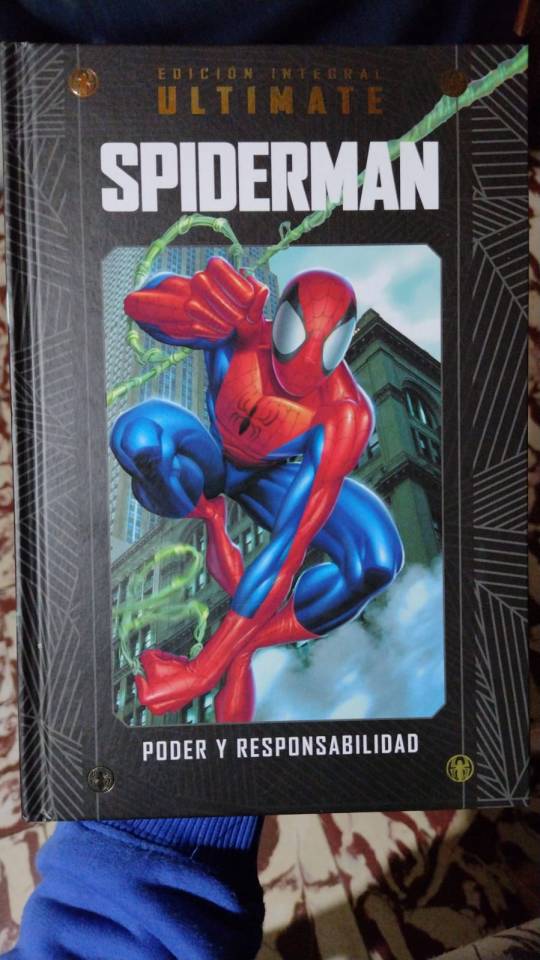
Mi Reseña en un Tweet:
Me lo compré solo porque estaba barato: la edición es hermosa y la calidad de impresión es espectacular Es su historia de origen con detalles raros (me copó su tía May) Fui juntando momentos homoeróticos o diseños particulares (ese Green Goblin mamadísimo es certainly a choice)
Mi Reseña Completa:
Este es el primer tomo de la colección Marvel Ultimate de (otra vez) Editorial Salvat. Por supuesto, para enganchar a los coleccionistas, el primero es más barato y como parecían ser historias que comenzaban y arrancaban en un miso tomo, lo compré (también el segundo, de X-Men, pero no creo comprar más).
La presentación es fantástica: tapa dura, con detalles en dorado y acabado brillante; páginas completas a todo color en papel couché brillo. Los fascículos que componen el tomo están separados por las portadas originales y a veces páginas con diseño geométrico, complementan bien el forro interno de la portada.
En este primer tomo, se recopila la historia de origen del Spiderman de Peter Parker para el universo Ultimate (Ultimate Spider-Man #1 a #13 y 1/2), un reinicio que hicieron a comienzos del nuevo milenio para que le fuera más fácil a las nuevas generaciones poder arrancar a leer cómics de Marvel, que habían acumulado un gran catálogo de lectura obligatoria para poder entender bien qué estaba pasando. Quizás también buscaban hacerlo más "relatable":

Con trama de Bill Jemas, la historia destaca, y no siempre en un buen sentido, por decisiones raras sobre los personajes a involucrar en las primeras semanas de Peter como Spiderman. La que más me llamó la atención fue el Green Goblin:
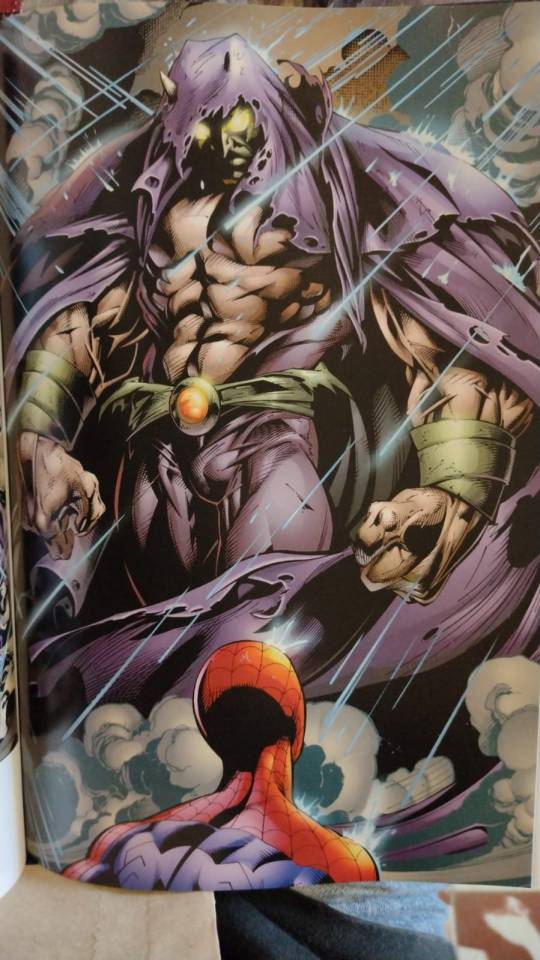
Después aparecen también Kingpin, Electro y Iron Fist (más como un cameo el último, pero igual), de los que solo el segundo se me hizo un personaje típico de Spiderman.
No puedo juzgar la historia en el vacío porque es una historia que ya vi varias veces: el origen de Spider-Man, la muerte del tío Ben, los primeros pasos como héroe, su relación con la tía May y con MJ. Agradezco los momentos de fan-service y homoerotismo.
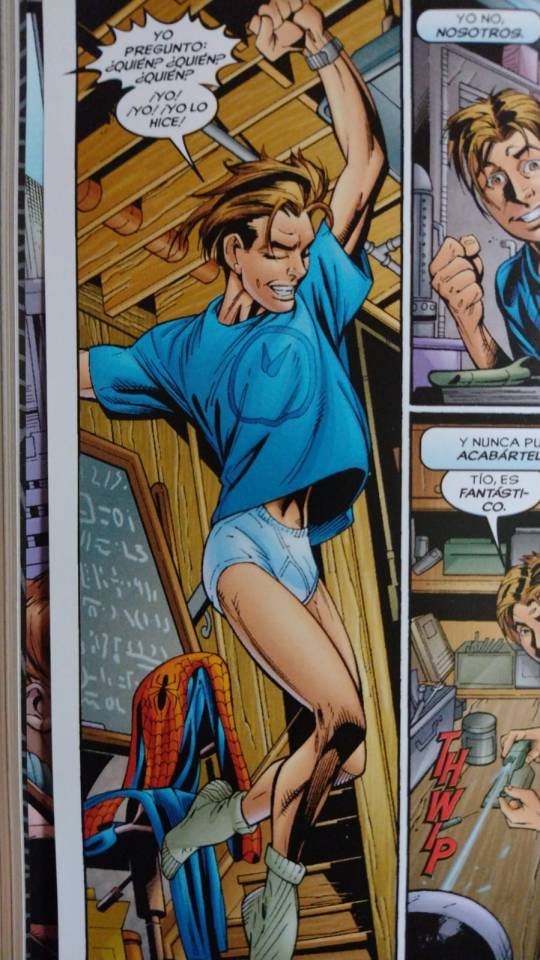
Las ilustraciones me gustaron, y el trabajo de los coloristas está bien logrado.
6.5/10.
Mis otras lecturas del 2023.
Reseña: El Mago Merlin en la Torre Oscura, Álvaro Marcos
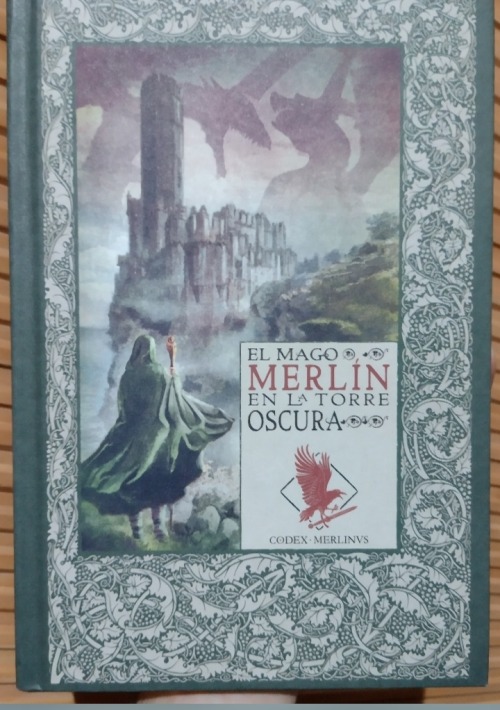
Mi Reseña en un Tweet:
Sigo enamorado de la prosa presente en esta colección Nunca quise tanto viajar en el tiempo como ahora, queriendo conocer la época del ciclo arturiano Las ediciones y apéndices me encantan Lástima hayan fragmentado la historia en tantos fascículos
Reseña Completa:
Este libro es parte de la misma colección que "El Mago Merlín y el Poder del Dragón", funcionando además como continuación directa. En esta oportunidad, Merlín aparece mucho más frío y decisivo, obrando según las visiones y presagios que se le presentan para restaurar a los herederos legítimos en el trono de Lornes.
Reúne cuatro cuentos alternando entre las perspectivas de Merlín y Aulus, el consejero algo siniestro de Vortigern, el traidor y usurpador.
Lo que más me sigue maravillando de estos libros y recopilaciones de los mitos del ciclo arturiano es la cuidada prosa con la que narra este mundo fantástico de los antiguos dioses. Tiene metáforas bien pensadas, los verbos y adjetivos justos, bien apropiados para transmitir la sensación exacta de los personajes: sea el pavor de Aulus ante la decadencia de su estrella pese a sus trampas, sea la cólera fría de Vortigern y la sádica violencia de su venganza, o bien la impasible frialdad con la que maniobra Merlín entre ambos.
Espero encontrar fácilmente el siguiente libro en la narración del origen de Merlín y el ascenso de Uther y Pendragon al trono, me gusta mucho esta historia y la narrativa más general de Britannia.
Como dato de color, mencionan y describen brevemente a Avalon, una isla que también me dio curiosidad de conocer más en profundidad ahora como tierra de los antiguos dioses.
Muy buen libro, lástima hayan fragmentado tanto la historia en distintos fascículos.
Una cita que me gustó:
— Se te atribuyen toda suerte de prodigios en aquellas comarcas. Traer la lluvia que puso fin a la sequía, impedir que ardieran unas brujas... «Hijo del diablo», te llaman. ¿Es cierto cuanto se cuenta? — La gente habla mucho —dijo Merlín por toda respuesta.
8.5/10.
Mis otras lecturas de 2023.
Book Review: Antonio Machado. Selection of poems by Jesús García Sánchez.
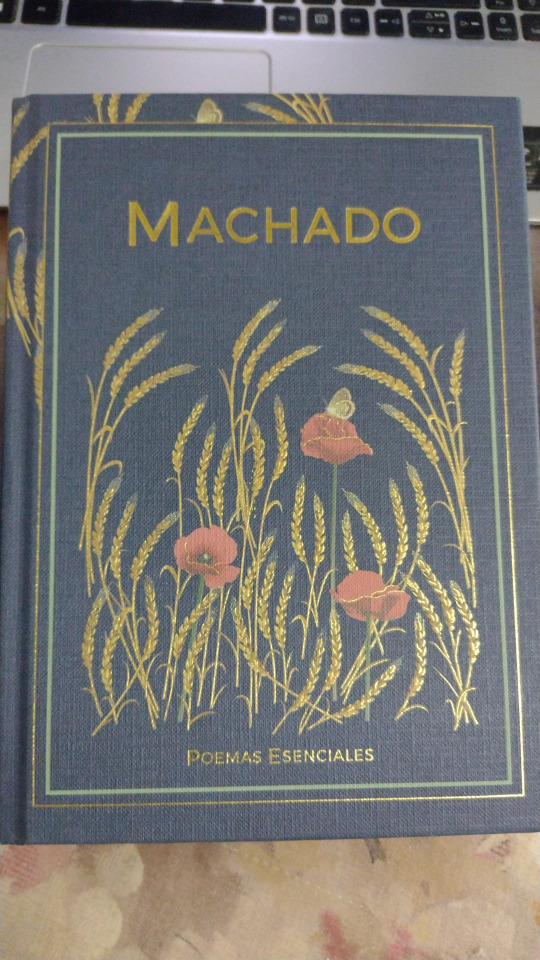
I don't think I have the academic formation for a deep contemplation and careful appreciation of poetry, and I have read very little poetry before, but by the end of the book, I believe I reached a faint understanding of Machado and his life as a spanish poet at the turn of the 20th century.
Some of the most recurring themes I noted on this selection that include his most famous works and cover 40 years of his writing are the captivating spirit of nature, the inevitable passage of time, the yearn and love for youthness, the evergreen presence of Death and the war that ravaged Spain.
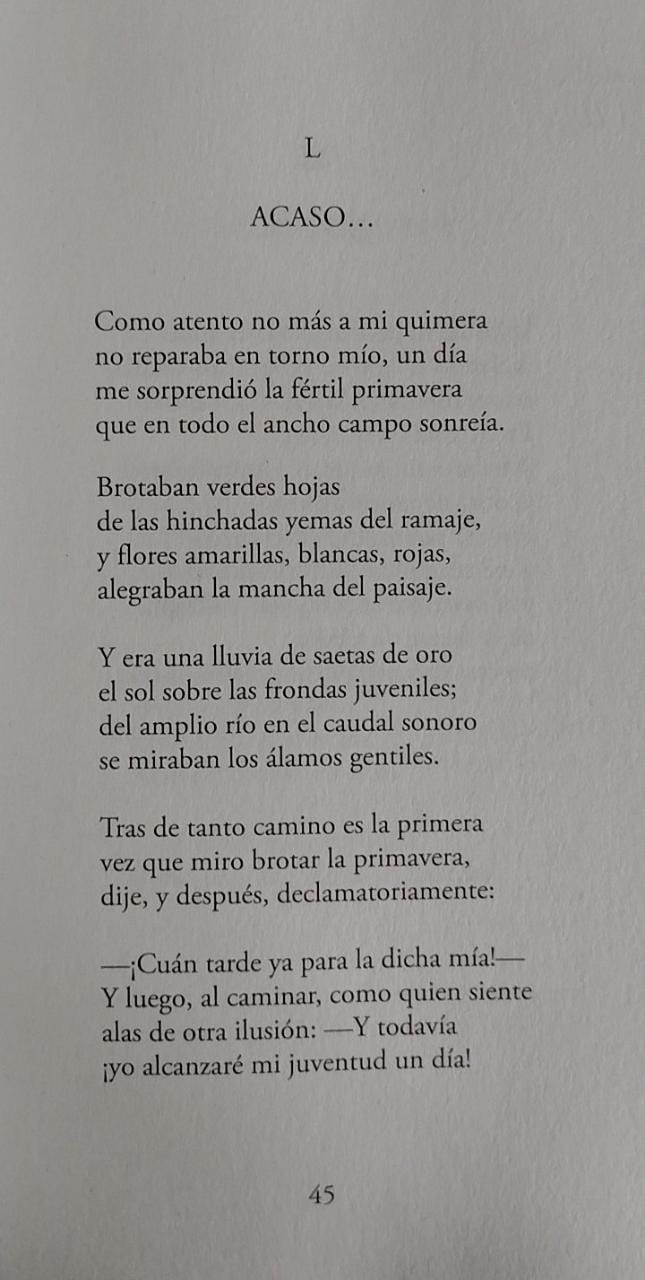
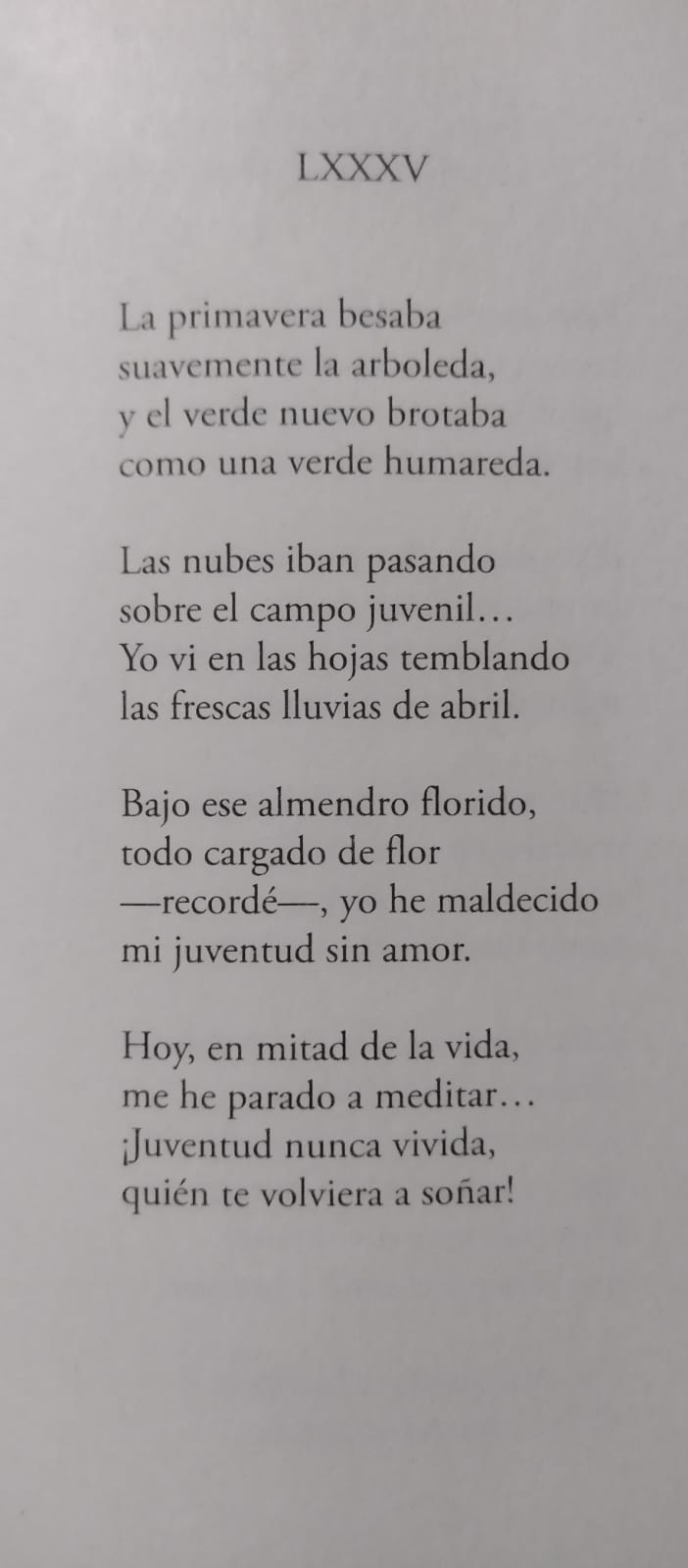
These two poems share the themes of nature (particularly, of Spring as a rejuvenating force) and the yearn of youthness. In both, the author gazes at the landscape around him as Spring turns everything green and new and alive. His train of thought is suddenly interrumped by the realization that his youth is gone, that life has passed. The key difference between them is the hopeful note the left poem ends with:
"— Oh, how late for my own joy! — And then, walking, like one who feels wings of another illusion: — And yet I'll reach my youth one day!"
Machado seems to understand youthness as a state of mind, as a quality one can cultivate or achieve rather than just an age. But then, on the second poem:
"Under that blossomed almond tree heavy with flowers — I remembered—, I've cursed my youth without love. Today, halfway through my life I've stopped to meditate... Youth never lived, who could dream you again!"
Then, maybe, love is what give us the will of living and youthfulness that pushes us through life.
On that vein, Machado says in one of his Proverbs:
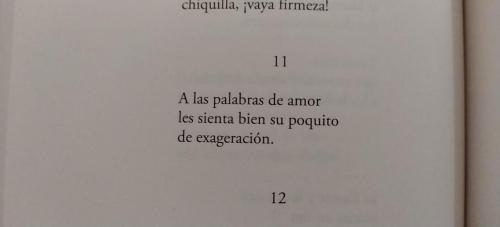
"Words of love fit nicely in a little bit of exaggeration"
But Machado stares a lot at Death too. It creeps and pops up randomly through his verses, maybe suddenly faced by the mortality of his life by the War or the passing of a person close to him.
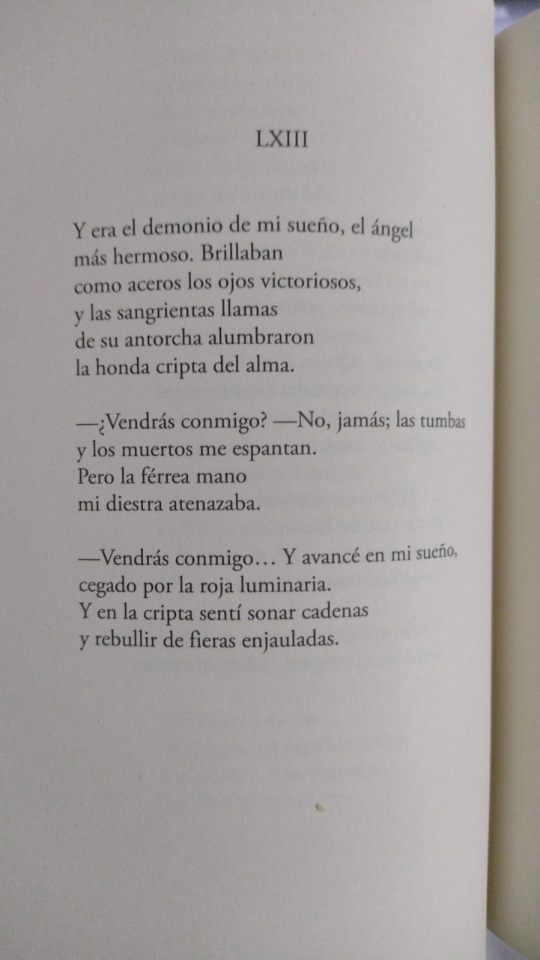
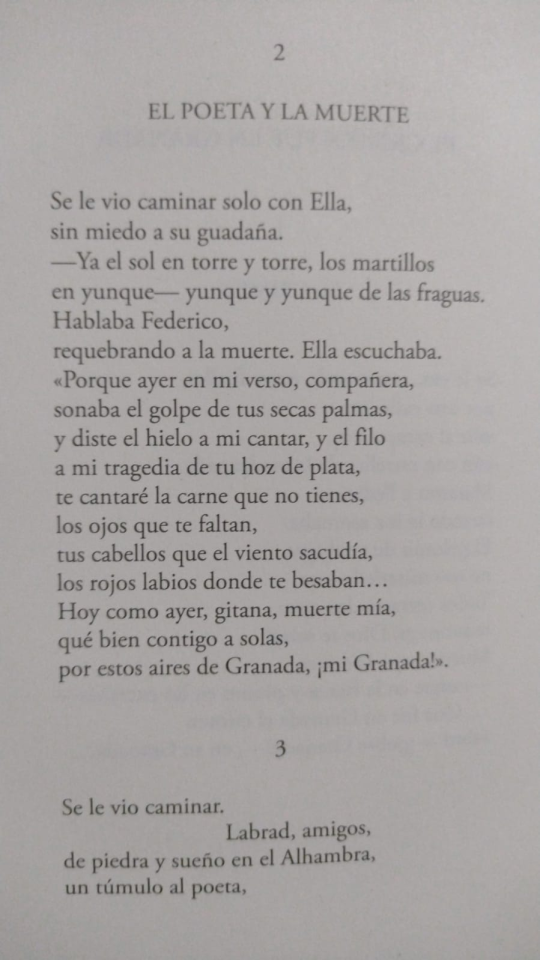
On the first poem, Machado dreams with a demon, who appears before him as the most beautiful angel, their eyes with a glowing heat of steel, the bleeding flames of their torch pushing the shadows of his soul. Machado is forced to accompany the angel and enter his own soul, ressembling a crypt, where he hears chains and caged beasts.
On the second poem, Machado writes about the death of another poet, Federíco García Lorca, murdered by order of Valdes because of his political views and his alleged homosexuality. But Federico walks with Her, Death, like if she were a muse, mourning about what's happening in Granada. In the poem, Federico even seems to pity Death, bowing to help her and restore her flesh, her eyes, her hair, her lips, singing them to her, as if thanking her for giving him edge to his poetry with her scythe and coldness to his songs.
Overall, Machado is a poet filled with zeist who loves life and delights about the cycle of death and rebirth in nature.
The poems I posted here were some of my favorites, but his whole Proverbs is filled with quotable excerpts and life advice. I don't want to give this book a score like I did in my previous reviews, it suffices to say that I enjoyed it and from time to time, it gave me something deeper to think about.
(I apologize in case of writing mistakes, this is my first review written from scratch completely in English)
My other 2023 readings.
Book Review: The Suicides Club, Robert Louis Stevenson.
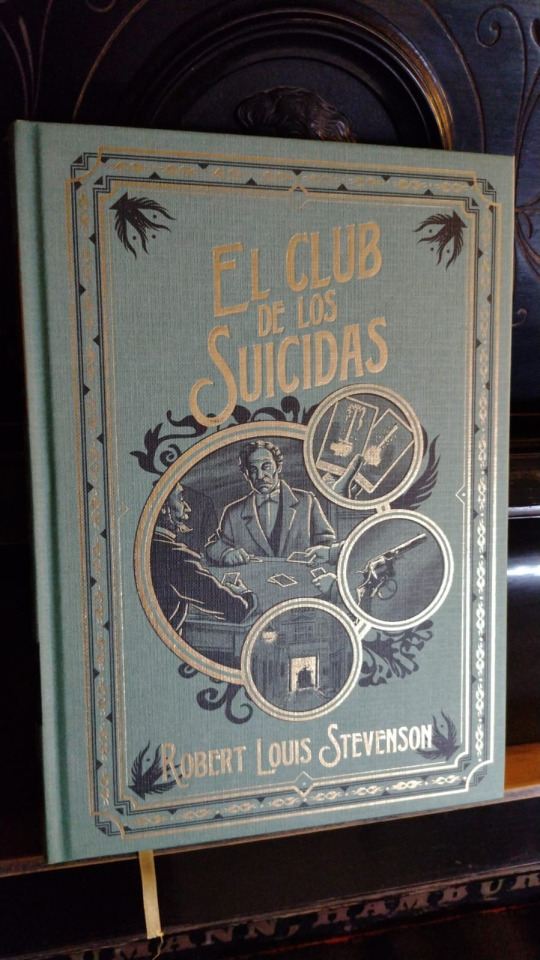
To surprise of my forgetful memory, I had already read this short novel, but given that I didn't quite remember the specific details of it, I took great pleasure in reading it again.
The plot is quite simple, really: prince Frorizel of Bohemia is a man quite brave but easily bored, always on the hunt of new adventures. Fortune puts him on the path of a stranger acting extravagantly on the streets of London, gifting people cream cakes or eating them if they refuse it. When asked about his behaviour in private, the man reveals to the prince and his confidant, colonel Geraldine, that he's a member of a private and very secret club, the Suicides Club.
The Club is exactly that: a group of men who want to die but for one reason or another can't muster the will to take their own lives. But the real kick is how they decide who dies next and how they solve the problem of the suicide: homicide at the hands of a fellow member of the club.
I don't want to spoil any further the story, so I will just give a general overview of the structure and what I liked.
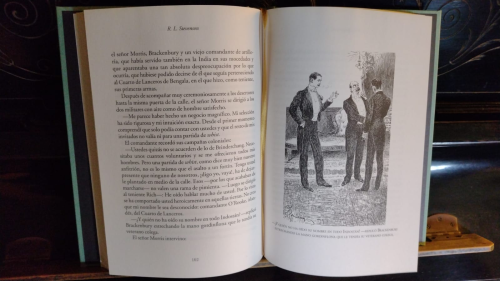
This short novel is divided in three chapters, each one from the perspective of a new character. The first, that of Florizel. The other two return eventually to the storyline of the prince, but succeed somehow into generating confussion in the reader about where the story wants to go or why it changed so drastically its perspective.
Given the collection this book is part of, I am a little puzzled at why would someone consider it a Crime and Mystery novel, at least in the traditional sense associated with Sherlock Holmes and Herculè Poirot.
Even more so considering this particular edition of the novel includes another short one: "The Misadventures of John Nicholson". I found it a very funny story on itself, but it stumbled like its main character through the plot without much thought or point to it.
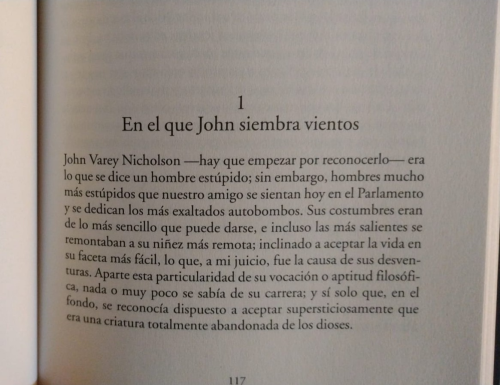
I include the first chapter because it has a stellar hook for a reader, and a translation below:
"John Varey Nicholson — one has to admit it — was what one could call a stupid man; nonetheless, men much stupider than our friend sit today at the Parliament [...] [John was] a creature totally abandoned by the Gods."
Overall, it was a pleasant and rather quick read, but not one I'll think much about in the future.
Again, I apologize for any crude error in my writing, I'm trying to practice more my English skills and this proves a helpful challenge.
My other readings of 2023.
What are you currently reading? :)

I'm reading the third book of Philip K Dick's complete works :)
This one is called "The Father-Thing", I read that one short story already, didn't stand out much, but I really liked "The Hangman" and "Some peculiar things about the eyes" (a funny observation about some linguistic expressions)
Book Review: The Invisible Man, H. G. Wells

My review in a Tweet:
"Would men turn evil if they were free from society?" is a frequent question in fiction and phylosophy in general, and while it's present in this book, it has been exaggerated on literary analysis that followed it. Overall, an interesting read with a very dull middle part.
Complete Review:
I decided to pause my other readings to dive into special thematic books for Halloween, while also complementing the nights I watch movie classics. So, for the first special review, I chose "The Invisible Man", by Herbert George Wells.
Years ago, I read "The Time Machine" by the same author, and it left a good impression of his writing skills. This time, while it wasn't bad, I'd say it left me a little unimpressed. The prose and descriptions, like the dialogues, were precise and well written but a bit dense. Wells would go over too many details, and although it's probably a common product of its time, it lacks a more deep or meaningful story.
The book it's divided in chapters, but I think the plot it's separated in four parts:
The arrival of the Invisible Man to a small town, his secret protected by the costume he wears.
The reveal of the secret and the following chaos.
The origin of the Invisible Man, told by himself to an old friend he runs into.
The manhunt of the Invisible Man.
The first part it's quite interesting as a reader, because we know what his secret is, so it's fun to read the guesses of the townspeople and the "mysterious events" that surround the stranger.
The second part is also fun, because of the paranoia and desbelief that the reveal of the Invisible Man provokes.
This third part, his backstory, the one I was most eager to read about (driven by the curiosity of getting to know how would the author explain or justify Griffins' invisibility) turned out to be so dull and slow. The proccess is a bit uninteresting (applying the refracting properties of an object to another thanks to a machine barely described), but the tedious first days of Griffin as an invisible man and his laments for all the unfortunate stuff that happens to him because no one can notice him is so... unsufferable. Specially because H.G. Wells decides to describe a lot the most boring stuff. We barely get to see a truly evil Invisible Man.
He does tell to his old friend that he needs an accomplice to declare his Reign of Terror, but by the time we reach this point, we have 10% or 15% of the book left, so the last part is mostly his friends saying No to him and helping the local police capture him (because the narration of his first days invisible gave him the information he needed). Griffin kills a man and injuries badly a few more men, but besides that and stealing money and food, he's no more evil than any person left behind by society.
So maybe, another possible interpretation to this story is not "Do men turn evil when free from society's watchful eye?" but rather "Men will do what they must to survive in a society that won't notice (help) them". Then, maybe, after a life like that, they will grow resentful and bitter like Griffin.
Score: 6.5/10.
My other 2023 readings.
Book Review: Frankenstein, or the Modern Prometheus, Mary Shelley
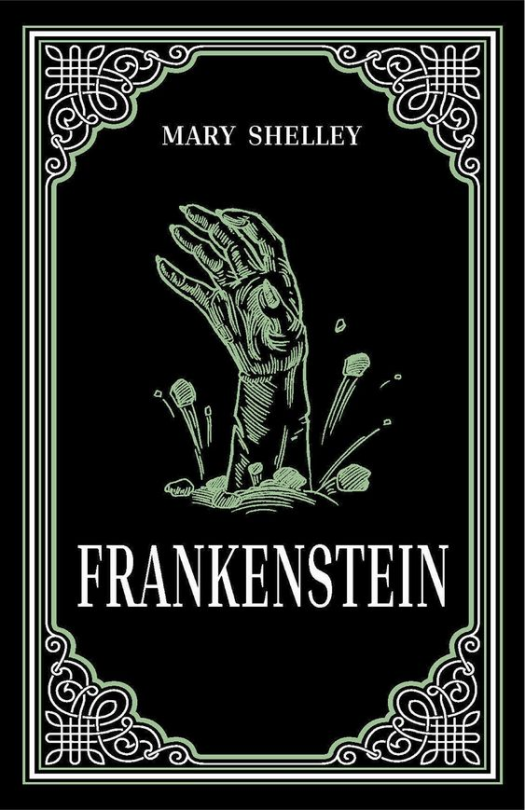
My Review in a Tweet:
Oh, Shelley, the care you put into the feelings and thoughts, dreams and nightmares of your characters shines through an exquisite writing. The dialogues read as if shouted to the crowd of a theater, trying to convey an emotion they feel new in its intensity.
My Full Review:
Continuing with the series of readings for Halloween, I went for the next one of the Classic Monsters (order entirely decided by the lenght of each novel). "Frankenstein, or the Modern Prometheus" by Mary Shelley, published anonimously at first on 1818, tells a generally well-known story of a man meddling with powers of nature beyond his complete comprehension and control: the energy of life.
The novel is a collection of letters and retellings of stories from differents points of view, which makes it a little "The Thousand and One Nights"-esque, reaching a point where we are reading the letters the captain of the ship wrote to his sister about the story Viktor Frankenstein told to him about the things the creature narrated to him about the tragedy of the poor family that lived in the cottage the monster was hiding in.
While Viktor Frankenstein seems to understand the "science of life" well enough for him to actually create life (or more technically, give a new one to things that were once alive), he seems to lack... responsability? I wouldn't say morality, because all throughout the novel he seems troubled by his experiment, by what he did and what it caused to the ones he loved, but only after many killings does Viktor actually confess or tells another soul about what he did. By that point, one loses any empathy and pity one might feel or have felt for either Viktor or the creature, both too enraptured and imprisoned in their feelings of guilt, remorse, sadness and anger to consider what they are causing to other people's life.
It's understandable to certain extent why they believe they are in the right, but their constant victimhood and cries for death upon themselves or upon others end up putting them beyond redemption.
This isn't to say the novel becomes unbearable because of this, on the contrary: the rich language with which they denounce the moral wrongs and the Providence's punishments they suffer and endure is very passionate and compelling, probably very typical of the Gothic movement the novel belongs to (I should read more literary theory).
I am a bit surprised and perplexed about which story beats have been used and expanded upon on different media such as movies, series, cartoons and other literary retellings. I think the character of Clerval has been very rarely used, if at all. The incident of the little girl that almost dies but is rescued by the creature is much more used, but it's quite a short part of the novel, and it's only mentioned once again, almost by the end of the book.
I'll make one short commentary in Spanish for any other argentinean readers that might come across by this review: que Viktor se case con la prima me pareció medio santiagueño (?
It was a very good reading, I enjoyed it a lot more than "The Invisible Man".
9/10.
My other 2023 readings.
Book Review: The Father Thing, Philip K. Dick
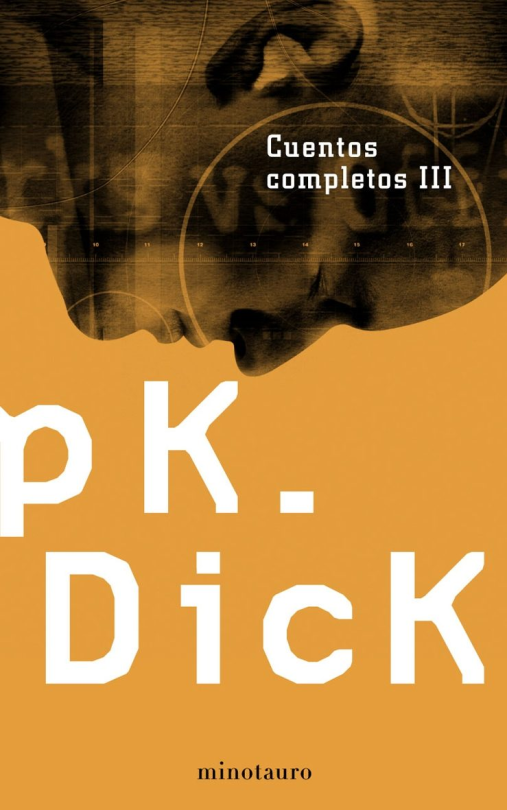
My Review in a Tweet:
In retrospective, I felt like I read it more like a chore, trying to read all five volumes this year. It has some good stories that left me thinking about the implicancies, but it was mostly filled with basic or uninteresting science fiction stories.
Complete Commentary:
I'm back! I just finished the third volume of Philip K. Dick's short stories, "The Father-Thing". I have to say, from the get-go, that it was probably the weakest one so far, with lower lows and not so great highs.
The more frequent topics and themes on this anthology are:
Ideologies and their radical extremes: from absolute polarization of society to political opinions taken to their most extreme realization, the author critizices and explores different ideas of his time, some of them being direct comments on recent publications.
Humanity and evolution: what will it be of humans in the future? The fate Philip K Dick envisions for us is rather dark or depressive in most of his stories.
Technology and humanity as a trait: Our relationship with technology is an evergreen topic in science-fiction, but in this anthology, it has a withered quality.
Clash of civilizations and classes
I'll make a short commentary for every short story, already ranking them from the one I liked the most to the one I liked the least:
Upon the Dull Earth: I realized while ordering up the stories that this was the one I liked the most and not the next one on the list. It feels more like a fantasy short story, but the ending is closer to a (cosmic?) horror tale.
The Golden Man: fantastic pace, fantastic ending.
Shell Game: the absolute paranoia of this colony and the TWIST. Loved it.
Sales Pitch: PKD said many people didn't like this story's ending and that he agreed with them. I disagree with both, the ending is great, but maybe because we like more cynical stories nowadays.
The Hanging Stranger: I love the ending, more themes of paranoia.
The Last of the Masters: it's unusual to read about anarchy, but it was very interesting, specially on the efforts to preserve some kind of hierarchy and burocracy.
Foster, You're Dead!: amazing satire, still relevant today.
War Veteran: I would really like to see this story adapted in a movie or series, it has great potential as a political intrigue/thriller.
A World of Talent: I rank it this high because of how convoluted and complicated the mutants' powers were. The plot itself dragged a bit too much.
Strange Eden: I like the ethereal feel of the story and the kind of "cautious tale" of the ending.
To Serve the Master
Fair Game
Pay for the Printer: I feel like we are headed this way with automated production and the lack of appreciation for manual crafts.
The Turning Wheel
Tony and the Beetles: relevant in today's political landscape.
Exhibit Piece: I despise the nostalgic feeling present in science fiction stories that imagine such a disastrous future that anything is preferred than that present, even flawed pasts. Even then, it's well narrated.
Null-O.
The Chromium Fence: I liked this satire as a valid commentary on today's need to always "pick a side", how pointing out valid critics to either viewpoint is considered as expressing symphaty for the other one. I disliked the ending, it felt like an easy way out.
The Eyes Have It: I liked it because it was fun, but I put it lower on the list because it feels very out of place in this anthology.
The Father-Thing: I liked better the author's explanation of this story, not the story itself.
Psi-man Heal My Child!: after reading A World of Talent, it felt very repetitive and unnecessarily complicated.
The Crawlers: pretty uninteresting.
Overall, I would give this book a:
6/10.
My other 2023 readings.
Book Review: Ultimate X-Men, Mark Millar, Adam and Andy Kubert.
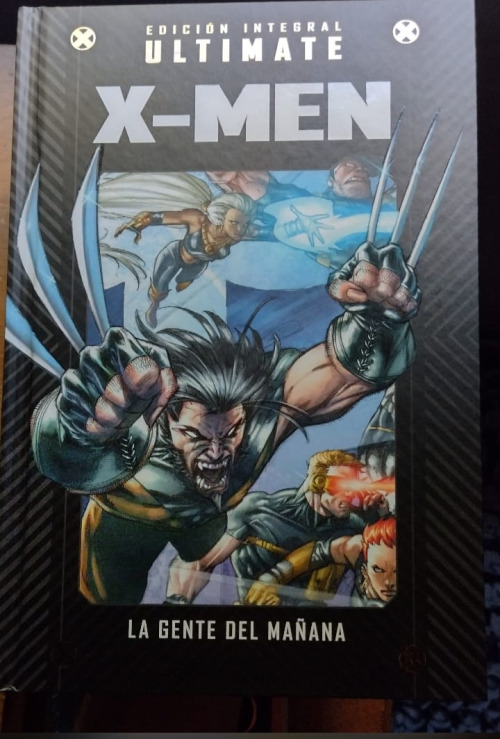
My Review in a Tweet:
I like how corny Marvel comics are. Being so cuddled by the MCU, it felt refreshing to see many characters just existing there and moving the plot by acting rather than being, like they didn't need to justify their existence for a greater plot and could just inhabit the universe.
Full Review:
Being primarily an MCU enjoyer (I wouldn´t call myself a fan now), seeing the plot of the Sentinels as the first thing in this comic book was jarring, as I was expecting a more introductory story before anything like that. It is an early story anyway, as the X-Men as a group are barely getting started in Men of Tomorrow. Scott Summers/Cyclops serves as the founding leader of the team under the tutelage of Charles Xavier as a group of mutants who seek to discourage the U.S. Government from implementing the Sentinels program, protect other mutants and impede Magento from recruiting them to his side.
The hard-cover book includes a second story arc, Return to X-Weapon, where Wolverine takes center stage and fights to rescue his newfound team after nearly betraying them in the previous story.
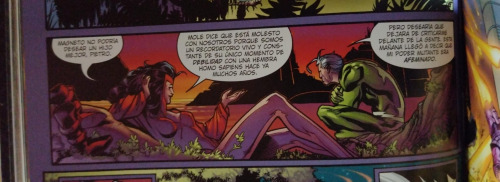
I rescued that panel in particular because it was hilarious to me for some reason (Quicksilver complains to Scarlet Witch that Magneto said that his superspeed mutation was effeminate).
Both story arcs were neatly written, with not much time to spare on developing the mutants, but maybe it's commonplace on issues dedicated to a team rather than to an specific character. Magneto and Xavier, as well as Wraith, have their time to shine and expose their views. I was delighted to see Nightcrawler on this, so half an extra point for that.
Overall, an amicable reading, not too deep, fun for moments. The artstyle is a bit underwhelming and there aren't many interesting compositions, but besides that, enjoyable.
6.5/10.
My Other 2023 Readings.
Book Review: The Name of the Wind, Patrick Rothfuss
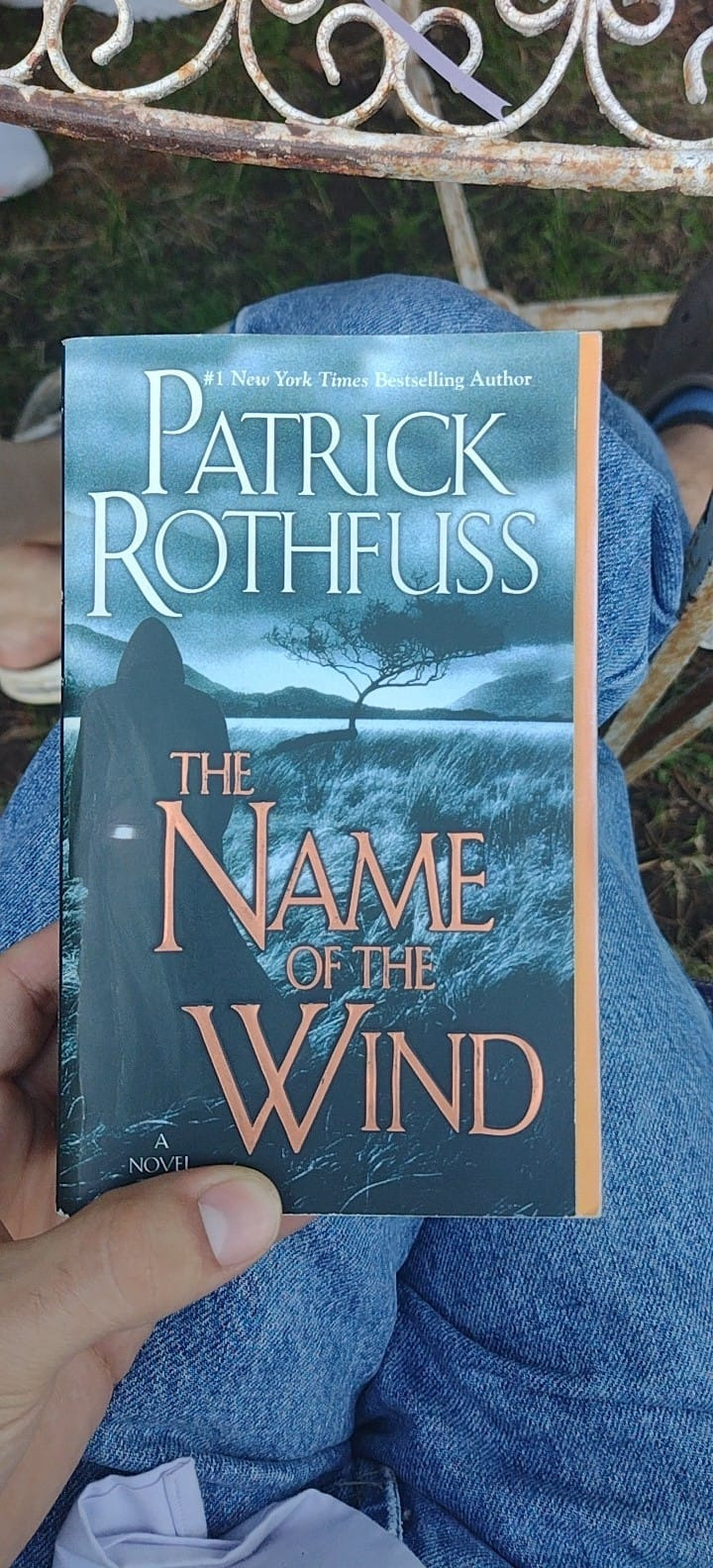
My Review in a Tweet:
I haven't been this enraptured, this mesmerized, this captivated by a book in years, and I don't say that lightly. It's great on every aspect you could think of, and then some other you couldn't even conjure. Can't believe I neglected it for so long. Highly recommended if you like fantasty of any kind.
My Full Review:
I had it sitting on my bookshelves for months before I decided to start reading this book. It felt menacing, despite it being the pocket edition. The sheer volume, the brickness of it felt like a challenge I hadn't the courage to face.
But once I did, I realized the real danger was being unable to let it go: I was prisoner of the author, being held by his marvelous ability to thread the story of Kvothe in seamless chapters, that natural the flow of the story felt, you couldn't even tell where he jumped from present to past and back.
The vivid images still dance in my mind hours after I finished reading the book. I rushed past the other reviews I had pending so I could write this one because I neded to talk about it. My copy of the book was a present from a friend so I texted her inmediately, but that didn't suffice, I had to write longer than all caps screaming to each other.
The rich world the author builds feels vast and mysterious, with a lot of hidden things lurking just beneaht the surface waiting for both the writer and the reader to discover them. I really hope (haven't looked it up yet) that there are books in the vein of the Silmarillion and Tom Bombadil where the myths and tales of this universe are further expanded.
The prose of Rothfuss is so elegant, filled with clever descriptions and unexpected analogies that not even the most fictitious elements of his story remain ungraspable to the reader.
The characters are so diverse and interesting: each and every one of them leaves a perdurable memory, no matter how brief and casual their impact and presence on the story is.
Kvothe is our main character, but he gets to be a narrator of his own story whenever we dive into his past, becoming a somewhat unreliable narrator. The whole book feels like that: we as readers submerging in the story narrated by Kvothe himself, gasping for air during the interlusions where the omniscient narrator takes the job back to move the story in the present time.
A wonderful work of worldbuilding, characterization and narration only hindered by the bittersweet taste of finishing the book eager for more. I hope to get my hands on the sequel soon, but I probably should let this world rest a little before diving in it again.
9/10.
My other 2023 Readings.
Book Review: Historias de Cronopios y de Famas, Julio Cortázar
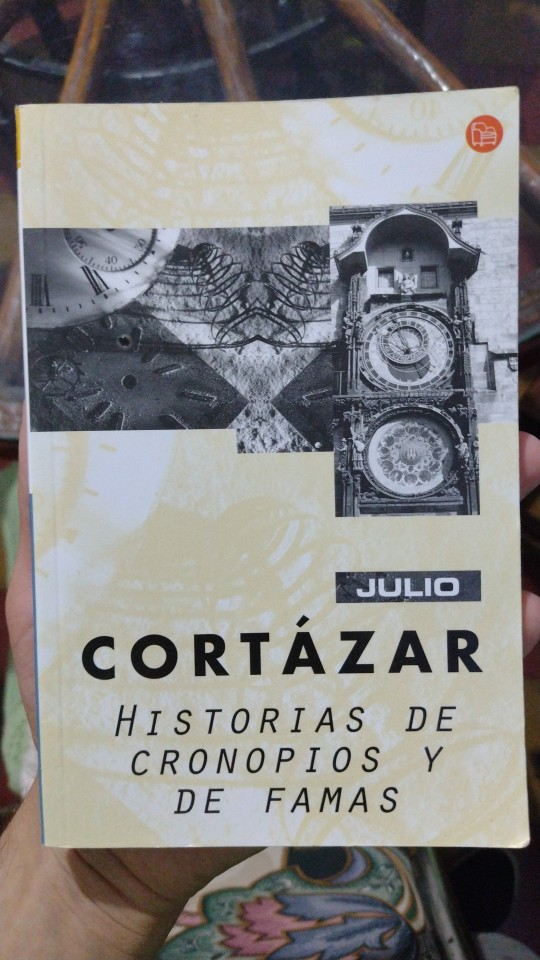
My Review in a Tweet:
Imagine you get a box filled with puzzle pieces, but they are all from different puzzles. You may see a familiar figure here, another face there, but no matter how you try to arrange the pieces together, you are sure it's not the meant image. Reading this book is like that.
My Full Review:
I became aware yesterday of my inappropriate lack of Argentinean authors in my reading list this year, and trying to mend that a little, I found this little book in a bookshelf while visiting my parents for the holidays.
While quite short, this book reminded me how much I ignore. I felt in a clear cultural disadvantage, where Cortázar (who some people may call the greatest Argentinean author) was playing a joke at my expense. I don't say this negatively.
Historias de Cronopios y de Famas is a collection of short stories, vague poems and... Nonsense. That's when the ignorance I felt started to creep in. I'm not sure of the exact literary current Cortázar belongs to, but this book read to me like an absurdist ramble without crossing over to dadaism.
I tend to believe that there are some clear themes of social and economic classes coating the short stories of the Cronopios, the Famas and the Hopes: they work as fictional and bizarre versions of Argentina's middle-to-low, high and (cultural) elite class respectively (I'm not sure about the Hopes). Cronopios are despised and treated condescendingly by the Famas, mocking their behavior and traditions, all too jovial and effusive and lazy; the Famas think too high of themselves and tend to use and abuse the other two; the Hopes seem to be trapped in an academic gasp, stunned by the lack of refinement of the Cronopios.
Even the short stories not directly related to the Cronopios and Famas act as a display of Argentina's idiosyncrasy, helped by the explicit mention of some elements, some places of this country (and more specifically, from Gran Buenos Aires).
But you have to remember that none of the stories really make sense. They are almost poetical, oneirical, nearing the realm of magical realism, very popular in Latin America.
The narration and writing themselves demand a lot of the reader's attention and time, forcing them to engage with the book to find some sense.
Again, I say all of this in a positive light: it's a challenging book in almost a literal sense, it presents itself innocently, like a bunch of nonsense, but soon you start to feel like there's something more underneath, like if under this outer coat of surrealistic and abstract tales laid a more tangible and grounded coat of the same color, merely a different tone but same color nonetheless.
I'm not sure how well this book would be received by non-argentinian or non-spanish speaking persons, but it's a good book anyways.
7,5/10.
My Other 2023 Readings.
And with those two last books/reviews, I finish this year's reading list. 30 books doesn't sound bad at all, I hope I can read that many and maybe some more next year!
📚 Mis lecturas del 2023 📚
¡Hola!
Lo venía haciendo en Twitter y decidí darle un mejor formato y mayor espacio, así que acá están mis lecturas de este año, en el orden en que fui terminando los libros.
Algunos los arranqué antes pero los pausé y continué con otro. Están clasificados y ordenados según la fecha en la que los terminé.
Enero:
Le Guin, Úrsula K. (1976) El Nombre del Mundo es Bosque. Editorial Minotauro
Albertalli, B. y Silvera, A. (2018) What if it's us
Klune, T. J. (2020) The House in the Cerulean Sea
Klune, T. J. (2020-2022) The Extraordinaries, Flash Fire, Heat Wave
Febrero/Marzo:
Continué lecturas, pero no terminé ningún libro, estaba preparando finales.
Abril:
Hall, Alexis (2020) Boyfriend Material
Doyle, Arthur C. (1902) El Sabueso de los Baskerville. Editorial Salvat.
Dick, Philip K. (1988) Cuentos Completos I: Aquí Yace el Wub
Hall, Alexis (2022) Husband Material
Mayo:
Marcos, Álvaro (2021) El Mago Merlín y el Poder del Dragón
Hall, Alexis (2022) Paris Daillencourt is about to Crumble
El-Motar, Amar, Gladstone, Max (2019) This is How you Lose the Time War
Miller, F., Janson, K., Varley, L. (1986) Batman: The Dark Knight Returns. Editorial OVNI.
Lewis, R., Mazzuchelli, D., Miller, F. (1988) Batman: Año Uno. Editorial OVNI.
LeBlanc, Maurice (1907) Arsène Lupin: Caballero Ladrón. Editorial Salvat.
Junio:
Dick, Philip K. (1989) Cuentos completos II: La Segunda Variedad.
Julio:
Silvera, Adam (2022) The First to Die at the End
Jemas, B., Bendis, B. M., Bagley, M., Thibert, A., Buccellato, S., Javins, M. (2001-2002) Spiderman, Poder y Responsabilidad. Marvel Comics. Editorial Salvat.
Álvaro, Marcos (2021) El Mago Merlín en la Torre Oscura
Agosto:
Machado, Antonio. (1899-1939) Poemas Esenciales. Selección de Jesús García Sánchez. Editorial Salvat.
Septiembre:
Stevenson, Robert Louis (1894) El Club de los Suicidas. Editorial Salvat.
Octubre:
Wells, Herbert George (1897) El Hombre Invisible.
Shelley, Mary (1818) Frankenstein, o el Moderno Prometeo
Capullo, G., Kubert, A., Lee, J., Snyder, S., Romita Jr., J. (2017-2018) Dark Nights: Metal. DC Comics. Editorial OVNIPRESS.
Noviembre:
Dick, Philip K (1989) El Padre-Cosa
Diciembre:
Millar, M. Kubert, A. & A. (2001-2002) Marvel Ultimave: X-Men. Men of Tomorrow. Return to Weapon X. Editorial Salvat.
Rothfuss, P. (2007) The Name of the Wind. DAW Books.
Cortázar, J. (2023) Historias de Cronopios y de Famas. 9a Edición. Buenos Aires, Punto de Lectura Editorial.
Arlt, R. (1926) El Juguete Rabioso. CAPÍTULO Biblioteca Fundamental Argentina. Centro Editor de América Latina.






























